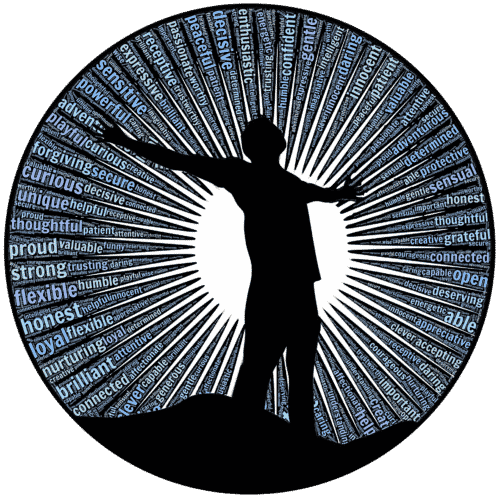Table of Contents
The New 21st Century Skill
By Thom Markham 
The problem with the 21st century is that it won’t stand still. Just when the goal came into focus — get students ready to be ‘globally competitive’ and prepare them for ‘tomorrow’s world’ by teaching problem-solving, collaboration, communication, and design skills — the planet decides to accelerate into its next phase. A confluence of events is laying this bare. Tectonic shifts in every country. Media and technology spreading great truths, no truths, and ‘in-between’ truths. Policies, pronouncements, acts of violence, fake news, shining examples of care, and a daily stream of circus-like news events flowing like a fire hose into everyone’s device. Adding to the mix is a constant revelation: What lay invisible or static for centuries—whether gender fluidity or male dominance or the size of the universe or humanity’s hidden impulses — has entered the public sphere for discussion and examination.
Mapped out mathematically, the pattern would be clear: Chaos. Chaos, in its ancient Greek form, meant a ‘gap’ or void. That is what we have. The rules have changed, but new rules have not been invented. And, chaos has yielded a predictable outcome: The human psyche has been rattled. In the absence of established norms, respectful discourse and consensus problem solving are fading to black, replaced by argument and extreme views. Instinctual, hard-wired emotions rise up. The optimistic desire to create a harmonious global society founded on inclusion, diversity, tolerance, and a unified approach to an endangered planet becomes a competitor to the darker urge to protect home, hearth, and loved ones from unsettling life change, threat, and ‘otherness.’ So let there be no mistake: At its deepest level, we’re now embarked on a fundamental human conversation about love and fear.
Also, as educators, let there be no mistake: This conversation will be front and center for the next two decades or so. Business as usual, particularly the education business in its industrial form, is done. Events mandate that education speed up its transformation from a system of compliance to a problem-solving enterprise. And, with this unsettling feeling bone-deep, teachers will need to do a deep dive and give students a lot more practice in preparation for global world 2.0. Our young people have been presented with a new set of operational truths, and we must respond by teaching them a new skill: Navigating chaos. To do that — and hold up our part of the conversation — some shifts in our own thinking is in order.
Turn Project Based Learning into a governing philosophy
Education worldwide is properly tracked to teach students to think independently by engaging them more often in project based learning and inquiry. So, our instincts are sound. But PBL is much more than a project design process, to be used when a teacher decides to stop ‘regular’ instruction’ and ‘do’ a project. The philosophy of PBL, with its focus on the process of discovery and teacher as guide, is a suitable umbrella that embraces personalization, design thinking, maker spaces, visible thinking, growth mindset, 21st-century skills mastery, technology, student-led instruction, and blended learning. A highly-qualified PBL teacher is a highly qualified 21st-century teacher. It’s time to establish PBL as our mental model of teaching and learning.
 Merge student voice with social-emotional strengths
Merge student voice with social-emotional strengths
Beyond PBL, two trends are visible in education: Student voice and social-emotional learning. Underlying these trends is a powerful impulse to prepare young people to self-direct their learning. But no one does this without personal preparation. Young people are being asked to devise a new set of global rules while flying an airplane that needs immediate attention and doesn’t necessarily have capable adult pilots. Keeping us aloft will require knowledge, wisdom, and personal courage. That tells us we better focus on character as much as calculus.
Shift from critical thinking to non-binary thinking
Young people must be ready to navigate a standards-less world in which nothing seems certain. They will not be able to rely on authority for answers, nor will they easily find a consensus on the best choices for going forward, nor will strict logic apply. More than ever, they will need to use non-binary thinking to navigate the world of chaos — and it will not be sufficient to rely on vague, undefined terms such as critical thinking. Instead, challenge students to solve and resolve ambiguous problems. Have them design and test solutions. Use the deeper learning model to put significant issues on their plate — and give them time to delve into the problem. Teach them to navigate the multi-polar chaos and choose their sources wisely. And note to self: This requires teachers who know and value the right sources. If you can’t discern fake news from sincere attempts at reporting and analysis, you should not teach.
Tap the group/global mind to solve and create
The deeper meaning behind PBL is that it allows students to engage in social learning, in which discourse, sharing, and deep collaboration tap the power of a group to test curiosity, resolve, moral judgment, and quality of thinking. A necessary first step is to stop thinking in terms of cooperative learning or group work. Our goal is not to teach students to ‘get along’; it is to set up the conditions and expectations for deep collaboration and innovation. Think in terms of teams. Teach protocols and visible thinking routines. Don’t reward students who just show up and don’t disrupt. Put them on a rubric that tests their willingness and ability to engage their peers in meaningful intellectual work.
Exchange standards for meaningful learning
Stop believing that better standards, or doing away with standards, or testing standards, or any system that revolves around constant chatter about standards, will save the day. We must find a way to avoid inviting coverage from teachers and a checked-off laundry list mentality from students. Time for subject matter experts to let go of teaching and testing every detail. Time for politicians to take on a learner’s perspective. Time to start teaching people instead of information. Time to minimize the curriculum and go interdisciplinary. Time to insist on helping students learn to engage in complex problem solving by moving daily work in the direction of inquiry, questioning, challenge, and defense. Time to reframe standards as a set of guidelines for personal rigor, accountability, and intellectual grasp. The mantra: Chaos is not compatible with fixed, written standards that define what one ‘ought’ to know. We should aim at something more fluid and personal.
Stand for love…oppose with love
Morality is on the table now. The drama of competing world views will not play out without conflict, sometimes intense conflict. All of us, young and old, will be tested as to our regard for humanity’s diverse viewpoints. Yet, we will need to find our moral center and stand for our version of truth. There is only ONE version that all can agree to: unconditional acceptance of each other. Those who cannot accept that must be opposed firmly, but with respect. This is the most difficult lesson at a time of chaos: No one can see clearly, so everyone has a viewpoint. Each must be respected, but each of us must imprint the chaos with a sincere and truthful view. It’s a test, folks.
Offer hope
How did the Greeks see it? Well, out of Chaos eventually evolved Gaia, a sense of each and wholeness. So we must offer a way forward and light at the end of the tunnel. Mathematically, chaotic patters resolve themselves into stable patterns that represent a new, evolved, and more orderly environment. I believe we should be helping young people see beyond the moment and understand that a powerful new world can emerge out of present circumstances. It’s always darkest before dawn, as they say.
Author Thom Markham, Ph.D., is an author, keynoter, consultant, and a founding father of PBL. He offers world class work to web, online training in PBL for teachers and schools through www.pblglobal.com. Follow Thom Markham on Twitter and sign up for the Online PBL Course Library.
- edCircuit SEL and PBL: Let’s Have One Conversation
- SEEN Magazine RIGOROUS STUDENT-CENTERED CLASSROOMS FOR THE NEW ECONOMY
- Ed Week Five Tips for Integrating Project-Based and Social-Emotional Learning
